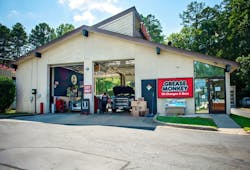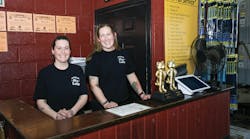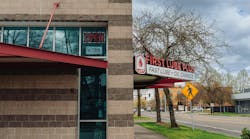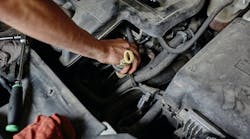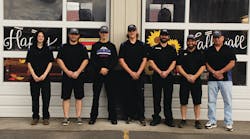John Malek knows when new customers are coming from some of the bigger chains. He says that his Florida shop will gain 20 new customers weekly during hot streaks. He’s got the paperwork to prove it.
“We actually take their stickers, believe it or not. We know where our customers are coming from,” Malek says. “If you're a first-time customer today, we take that sticker and at the end of the day, we put them all on a piece of paper.”
That paper is a totem of customers who have defected from the area’s chains and came to his shop: Mr. Oil Xpress Lube of Sebastian, Fla. The three-bay shop has had an impressive turnaround under Malek’s operatorship, and it doesn’t show signs of slowing down. When he took over about five years ago, the shop was doing up to 35 cars daily.
This spring and summer, with drivers getting back out on the roads, he’s seeing a surge.
“We're doing an average, right now, of 90 cars per day, six days a week,” he says. “And we’ve done as much as 135 cars per day”
Malek’s geographic reach extends only to the edges of that single commercial property along Florida’s U.S. Highway 1, but his industry impact goes much farther. As a single shop owner, he’s having a great time.
Growth is a great thing for the quick maintenance industry, whether it’s new operators opening their first shops or big operators serving thousands of cars across states. But it’s hard to overlook the strength and attention that single-shop owners bring to the industry.
Smaller shop owners, those with one or two locations under management, make up most of the respondents in the 2021 NOLN Operator Survey, which provides the added context to this report. The result is a celebration of the small-scale operators, who bring traits that lube shop networks of any size can find valuable for success.
Market Motivation
The insight that Dan Newell received by working at a nearby shop helped him to build his own operation. It all started shortly after 2010, when Newell left a career in NASCAR and found himself in between jobs. He took a gig working at a Grease Monkey in Mooresville, N.C.
Newell and his wife, Sheila, became interested in the business and started thinking about starting a shop of their own. A couple years later, they found the perfect fit with a nearby seller and purchased their own Grease Monkey in Salisbury, N.C.
Newell learned early on that servicing customers isn’t the same from one location to the next.
“I learned very quickly that even though the Mooresville store is 25 miles away, it’s a whole different world over there,” he says.
Mooresville, situated near Lake Norman, has a much higher median income than Salisbury. Newell says that he didn’t see sales of added preventative services as often, because the clientele bought and sold vehicles more often.
“Versus Salisbury, which is very blue collar. It’s like, ‘Yeah, I need you to work on my car, because it needs to last,’” Newell says.
That kind of insight can change a shop’s inventory and sales strategies. Newell’s shop in Salisbury might sell more periodic preventative services than at a location where customers think more short-term about their vehicles. Try to push those services too hard in the wrong market, and you’ll just find a higher failure rate.
This is essential advice for the single shop owner, whose success is tied to that one market. But even for large networks, it’s important to look locally at each location and make changes that fit the local clientele.
Perspective: Small Operations by the Numbers
(Owners with one or two locations)
—
Car Count
Small Ops: 36
Overall Average: 38
Ticket Average
Small Ops: $80
Overall Average: $75
Manager Tenure
Small Ops: 10.2 years
Overall Average: 9.75
(Source: 2021 NOLN Operator Survey*)
“You have to know your avatar,” says Mike Aguliaro, cofounder of CEO Warrior. “You have to know your customer really well.”
Agugliaro has been training small business owners to become successful CEOs for years. He started by building his own small electrical contracting company with two employees into a company with 190 employees and $32 million in annual revenue at its height. After selling his electrical business, he’s grown his coaching outfit, CEO Warrior, to encompass business owners from many fields.
The concept of a customer avatar is important, he says. It helps an owner know who he or she is reaching with marketing, service offerings, and sales strategies. And it allows the owner to make more strategic investments and bold moves that make an operation stand out.
How can you get that information? Agugliaro says that a simple, well-planned survey is a great start.
“Asking people good questions is cheap. And you don't need to hire an expensive agency to figure it out,” he says. “You just need to have somebody with a good personality to ask customers when the experience is over: ‘Hey, can I just get five minutes of your time?’”
Over the course of a month, if you knew that four out of five customers would rather wait in their vehicles than in a waiting room, would you tailor your business to match that preference? The difference can be impactful.
The smaller operation has a leg up in these matters. A large network might have layers of company leadership to communicate through before making a change, particularly in multiple shops.
“A big boat, it takes a long time to turn it. It takes a lot of decisions to turn,” Agugiaro says.
The smaller operator is nimble to try (and sometimes abandon) new ideas or strategies.
Ads for All
Much like the different approaches among different markets, there’s no one strategy that fits for advertising and marketing your shop. In fact, the rule of thumb is that all-of-the-above advertising is what the focus should be, according to Newell and Malek.
Paid advertising should help to foster the holy grail: Get customers to talk about your brand.
“We tried all different kinds of advertising,” says Sheila Newell, who does much of the operations work for the shop. “Newspaper, radio. We still sponsor some softball leagues, but what we found works the best is word-of-mouth.”
Take advantage of a popular radio station or social media group in your area for focus, but customers tend to be all over the place with advertising consumption. Therefore, your marketing needs to be that way, too.
That overhead cost can pile up, so it’s important to set a budget. But realize the importance of getting your name out there, especially in competitive markets.
“We spend probably $60,000 to $70,000 (annually) just on advertising,” Malek says.
That strategy might mean heavy in radio for six months and then heavier in a print medium after that. Malek says that the mix can vary.
The one medium that everyone’s on and checking is the internet. The upshot is that it costs little to nothing to get your name out on those platforms.
Social Media Use by Platform
—
- Facebook 79%
- Google My Business 53%
- Instagram 20%
- Twitter 12%
- LinkedIn 8%
- Snapchat 4%
- Pinterest 1%
- TikTok 1%
- None 15%
(Source: 2021 NOLN Operator Survey*)
Sometimes it takes a little additional comment from your courtesy techs. Look up Malek’s shop on Google, and you’ll find more than 600 reviews and a total rating around 4.9. That’s something that Malek’s techs pitch to customers after a great service experience. If the service was good, would the customer mind leaving a review on Google?
“Letting the customer know to put it out there that you went out of here happy,” Malek says.
The majority of customers, especially younger drivers, are checking out customer reviews before committing their patronage to a business. Customer reviews make a real difference.
The bottom line? Be comprehensive, be active, and respond to your customers’ interests.
Team Strength
Small shops have tight-knit staff teams. This can be a great asset as smaller operators are able to build relationships with each tech and promote a sense of purpose and shared responsibility.
To hold team members to account and to carry out the operator’s mission, the manager position is crucial. A great manager is the key to success at the single-shop level.
At Newell’s Grease Monkey shop, that person is Dustin Carr.
“I've got customers, seriously, who will pull up and ask for Dustin,” Newell says. “If he’s off, they say ‘Oh, I'll come back tomorrow.’ He has just established such a bond with an enormous group of our customer base that if he’s on vacation or off for a day, they notice.”
Carr came from that Mooresville store that Newell had worked at. Newell recognized his potential right away. As a manager, Carr has shown his commitment by completing professional training sessions regularly. As a salesperson, Newell says that Carr is second-to-none.
“He’s probably one of the top five managers in the country, if not the best,” Newell says.
That’s one of the biggest reasons that Newell’s shop has improved from about 13 cars daily when he took over to around 40 today.
The Quick Lube Workforce
—
Starting Wage for Techs
$11.78
Average Wage for Techs
$13.90
Manager Salary
$56,057
Other Stats:
Manager Tenure: 9.75 years
Tech Tenure: 3.9 years
Average Weekly Hours per Tech: 41.37
(Source: 2021 NOLN Operator Survey*)
At Malek’s Mr. Oil Xpress Lube, that person is Vernon Ohler.
“Vernon came in as a hood tech and he has done just an amazing job with the employees and with the customers,” Malek says. “I could go home and sleep like a baby knowing that the business is working extremely well.”
The manager is the glue that holds together a staff of techs and the owner’s vision for shop culture, but it’s just as important to recognize excellence throughout your ranks. Smaller shops can be especially adept in this department.
Agugliaro says that owners must create a holistic environment to maximize retention, whether that’s for the store manager or the entry-level tech. It’s not enough to just have good pay. There should be opportunities for growth, both financially and personally.
“My culture, I invested in not just making them great employees or a team, I invested in giving them skills that made their careers great and their lives great,” he says.
It’s just good business. These are the people whose work makes or breaks the customer experience. Employees need to care about their role and their success in the bay. It’s up to the owner to promote that importance. Newell does just that, emphasizing the role his employees play in keeping the company going.
“We recognize that we are who we are because of them,” Newell says. “And if you take care of your people, your people will take care of your customers.”
Identifying and praising good work among techs is a great place to start. Don’t discount the power of perks, either. Newell says that he often sponsors lunches and dinners for his crew, as well as outings and bonuses for revenue boosts and during the holidays. All of those perks are deposits in the bank of employee care.
Of course, the fundamental offering of a competitive wage is important for hiring talent. Newell has seven employees on staff for his two-bay shop. He says that he sees turnover just like most shops—the data show that small shops only have slightly longer tech tenure than the overall industry average.
What Newell does offer are competitive wages, paid holidays, and bonuses. And his employees know that there’s a system in place for wage growth. That’s a great avenue for retention. Newell says that one of his techs recently turned down another job that offered $2 more per hour.
“And he said ‘no’ because he still has room to grow financially with us,” he says.
Be the Exception
If you followed the earlier advice and studied your market, you likely also know how competitive the industry is for small operators. Lube shops are battling increased competition as customers are going longer between oil changes.
Because there are so many options out there, customers can begin to see lube shops as a monolith. It’s important for small shops to find that factor that turns a drive-by customer into a repeat customer.
“You win with people,” Newell says. “You need people to come into the store to buy the product. And if you don't have the right mindset, it’s not going to work.”
Agugliaro sees the COVID-19 pandemic as a bit of a turning point for customer preferences. Prior to the pandemic, he says there was a stronger sense of social disconnect in commerce, like in the way that people flock to the self-checkout aisle at the grocery store. It was quick and non-experiential.
After going through the pandemic, a time in which people were forced into disconnection, Agugliaro says that customers have emerged with a different view. They want to have connections more than ever. They want to be noticed and taken care of beyond the basic business transaction.
“We’re in a day now, where people are starving for connection and starving for experience,” he says.
Of all the business strategies out there, Agugliaro says that there’s one that should get the most critical thinking: How do you make your customer experience different?
That means that the key difference that will make or break a small shop operation isn’t found in a flashy sign or an inflatable tube man in the front lot. It’s from the premium experience and attention that comes from the single store level—the single customer level.
“It’s just all about the customer,” Malek says. “And I drive that into our employees. I tell them it’s all about the customers. It’s not about the products that we handle, it's not about you or anybody else. It’s about the customers.”
And it’s incredible how customers will respond to that individual attention. Malek says that his shop leaves out two tip jars, which might collect $40 in a day. Around the holidays, people might drop a $50 bill in one of those jars for the staff. Customers have brought them cake, sandwiches, and other gifts that reflect how much of a relationship they’ve built up over time.
There’s another aspect of shop culture that can make a real difference with customers, and it’s harder to define. It’s the enjoyment factor. It’s the atmosphere that’s created when staff and managers have positive mindsets. Customers pick up on that.
Agugliaro tells the story of an old farmer cutting crops by hand in the sweltering heat for 14 hours per day. You might assume that the farmer is frustrated with such hard work over long hours, but he isn’t. He shifted his mindset, viewing each cut as part of his swordsmanship training.
“He had a different framework. Every cut he was doing was training. He was practicing his sword cut,” Agugliaro says. “He got up in the morning and was excited because he had 14 hours to train.”
In different markets with different operations, that’s a quality that Newell and Malek share. Their positive attitudes carry them in leadership and make real impacts.
In a single-store operation, that’s a factor that starts with the owner and ripples down through the shop staff, into the sales process, and on to the customer experience. That factor isn’t derived from heavy advertising or built into the service menu. It comes from culture and leadership.
“You can't imagine how many people have said they’re comfortable sending their 16-year-old here because we won't bully them into selling something they don’t need,” Newell says.
Malek, who has a few different business interests, chooses to spend his time working in an office next to his shop.
“It’s a lot of fun,” Malek says. “I enjoy being here six days a week. And we just love it, because everybody loves us.”
*Special thanks to Valvoline for sponsoring the 2021 NOLN Operator Survey!
